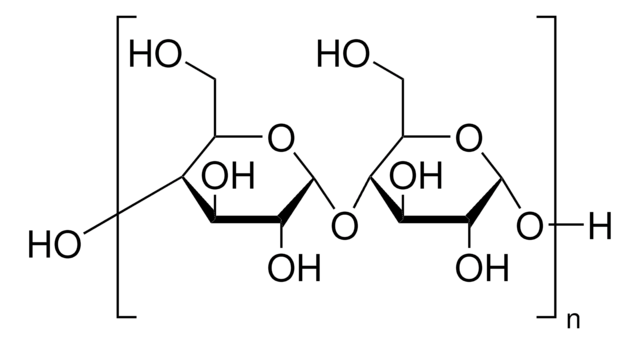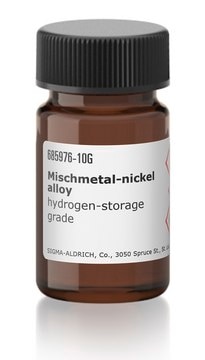GF27295724
Cerium
foil, 50x50mm, thickness 0.1mm, as rolled, 99.9%
Synonym(s):
Cerium, CE000210
Sign Into View Organizational & Contract Pricing
All Photos(2)
About This Item
Empirical Formula (Hill Notation):
Ce
CAS Number:
Molecular Weight:
140.12
MDL number:
UNSPSC Code:
12141601
PubChem Substance ID:
NACRES:
NA.23
Recommended Products
assay
99.90%
form
foil
manufacturer/tradename
Goodfellow 272-957-24
resistivity
73 μΩ-cm, 20°C
size × thickness
50x50 mm × 0.1 mm
bp
3443 °C (lit.)
mp
795 °C (lit.)
density
6.67 g/mL at 25 °C (lit.)
SMILES string
[Ce]
InChI
1S/Ce
InChI key
GWXLDORMOJMVQZ-UHFFFAOYSA-N
Looking for similar products? Visit Product Comparison Guide
General description
For updated SDS information please visit www.goodfellow.com.
Legal Information
Product of Goodfellow
signalword
Danger
hcodes
Hazard Classifications
Flam. Sol. 1
wgk_germany
WGK 3
flash_point_f
Not applicable
flash_point_c
Not applicable
Certificates of Analysis (COA)
Search for Certificates of Analysis (COA) by entering the products Lot/Batch Number. Lot and Batch Numbers can be found on a product’s label following the words ‘Lot’ or ‘Batch’.
Already Own This Product?
Find documentation for the products that you have recently purchased in the Document Library.
Ivana Celardo et al.
Nanoscale, 3(4), 1411-1420 (2011-03-04)
Nanotechnology promises a revolution in pharmacology to improve or create ex novo therapies. Cerium oxide nanoparticles (nanoceria), well-known as catalysts, possess an astonishing pharmacological potential due to their antioxidant properties, deriving from a fraction of Ce(3+) ions present in CeO(2).
Endomyocardial fibrosis--the possible connexion with myocardial levels of magnesium and cerium.
S M Valiathan et al.
International journal of cardiology, 28(1), 1-5 (1990-07-01)
C J Van Noorden et al.
Journal of microscopy, 171(Pt 1), 3-16 (1993-07-01)
Methods based on the use of cerium to detect the activity of oxidases and phosphatases are rapidly expanding. Both classes of enzymes can be demonstrated with cerium at the electron and light microscopical level. The in situ detection of H2O2
J W McDonald et al.
Modern pathology : an official journal of the United States and Canadian Academy of Pathology, Inc, 8(8), 859-865 (1995-10-01)
Rare earth pneumoconiosis is an uncommonly reported disease caused by the inhalation of dust containing lanthanides, also known as rare earth metals, which are common industrial materials. The pathologic manifestations and natural history of this disorder are incompletely understood. We
Ali Bumajdad et al.
Advances in colloid and interface science, 147-148, 56-66 (2008-11-26)
This review concerns recent research on the synthesis of cerium oxide (also known as ceria, CeO(2)) in colloidal dispersions media for obtaining high surface area catalyst materials. Nanoparticles as small as 5 nm and surface area as high as 250
Our team of scientists has experience in all areas of research including Life Science, Material Science, Chemical Synthesis, Chromatography, Analytical and many others.
Contact Technical Service




